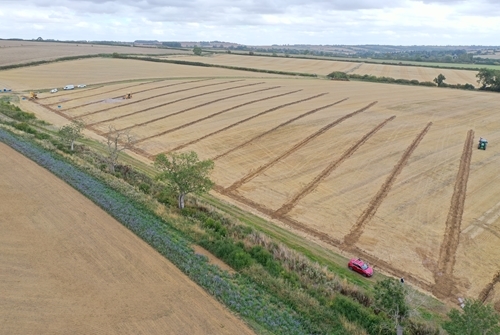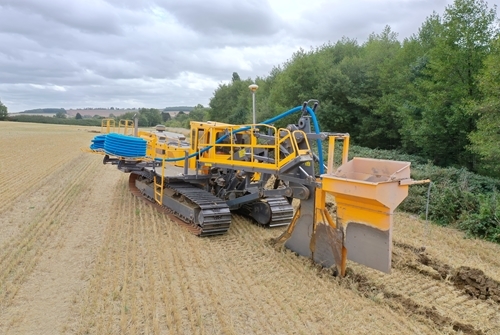Joe, Stanley, Head of Sustainable Farming, Allerton Project
As a farmer I have always been fascinated by field drainage systems; invisible networks of drainage channels running underneath much of our farmland carrying away excess water to field-edge ditches, thence away to streams and rivers. In the early modern period these would consist of infilled stones or even brushwood; in the Victorian period we moved on to individual sections of clay pipe, before transitioning to perforated plastic backfilled with gravel in the 1970s.
Without drainage, much of our farmed land would be semi-permanently waterlogged to the severe detriment of agricultural production. This is why government, in the post-war period, invested so heavily in helping farmers to drain literally millions of acres of land, grant-aid ending only in the mid-1980s. Since that time, the area of new drainage schemes installed has fallen by some 90%, while the life expectancy of most if not all of the schemes established in those decades has now expired to the detriment of yield, especially as climate change gives rise to more intense and extended periods of winter rainfall. At Loddington we are only too familiar with the sight of waterlogged arable fields in which either planting is impossible or seed has already failed. Nationally, many of our crop yields are in decline: poor field drainage is, I believe, one of the key reasons for this.

However, there are also extensive environmental benefits to field drainage. Although ‘regenerative’ techniques such as the planting of cover crops and reduced tillage are rightly proposed as mechanisms to improve soil health, in most circumstances – and certainly on our heavy silt-clay land – they must sit atop a foundation of well-drained soil, or to put it another way: good luck planting a cover crop in a waterlogged field. Healthy, aerated soils are a better habitat for all the beneficial life which lives in them (it’s thought some 60% of all species on earth reside in soil) and this is a key indicator of soil health.
Waterlogged soils are highly prone to surface runoff taking soil, pesticides and nutrients with them, potentially to the detriment of surface water quality and biodiversity. A well-drained soil acts like a filter, with nutrients and pesticide residues sorbing onto soil particles as rainwater percolates down, as well as reducing the risk of water turbidity. Extensive research at Allerton has also demonstrated that wet, compacted soils have a significant issue with the release of nitrous oxide gas, which is some 300 times more warming than carbon dioxide. As such, a well-drained soil should also have less climate impact.

Remarkably, little data exists in a UK context to support all of these environmental benefits, which is why the Allerton Project has launched a groundbreaking trial to assess the impact of a modern field drainage system. Installed in August 2025, we have re-drained some 4ha of an 8ha arable field, leaving the other half with its historic drains installed pre-1980s. Over the coming years, we will take comprehensive measurements of comparative soil moisture, runoff, nutrient and pesticide loss, soil bulk density and structure, greenhouse gas emissions and production factors such as yield and weed prevalence. We will be collecting this data across differing tillage regimes – direct drilled and ploughed – in order to assess the impact of both on our outcomes. This will enable us to provide a true picture of the impact that field drainage has for both food production and the environment, and hopefully kick-start a national conversation including farmers, government and the food supply chain as to how we can begin to re-invest in this vital – if unassuming – infrastructure and how doing so can help us meet many of the challenges we now face as a nation (and in some cases have legally binding targets to meet).
What we are not advocating for is a return to the actions of the post-war period in which much valuable habitat was drained and put to the plough in a race to maximise food production. Indeed, I would advocate putting ‘the right drain in the right place!’. At Allerton, we have historically broken field drains in some areas of low productivity to allow the re-creation of valuable wetland habitat. However, we do need to address the impact that deteriorating soil conditions are having on some of our most productive agricultural land, and that waterlogged soils are having on our environmental and climate targets, and this project will give us the ability to begin that conversation from a place of evidence.
We are thankful for the support of our project partners in this trial:
- National Association of Agricultural Contractors (NAAC)
- Farm Services Ltd
- Agricultural and Horticultural Development Board (AHDB)
- Anglian Water
- GW Axup & Co Ltd
- Mastenbroek Ltd
- Natural England/Catchment Sensitive Farming
- Syngenta